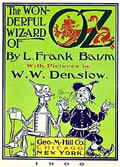 Title: The Wonderful Wizard of Oz
Title: The Wonderful Wizard of Oz
Author: L. Frank Baum
Source: audiobook
Text: http://publicliterature.org/books/wizard_of_oz/1
Audio: http://librivox.org/the-wonderful-wizard-of-oz/
Notes: Being a child, I have read the Russian version of this book (there are 6 books comprising the series based on The Wonderful Wizard of Oz), written by Alexander Volkov, the first of which is almost identical to the L. Frank Baum’s original. I have also enjoyed listening to The Dark Side of the Rainbow (syncing the Pink Floyd’s The Dark Side of the Moon to The Wizard of Oz movie made in 1939). And so I have decided to finally check out the original book.
The most of the characters and events are very similar to the Volkov’s version, with a few exceptions. The main character is called Dorothy (as opposed to Elly) and the good witch of the South is named Glinda (as opposed to Stella), etc. Most of the discrepancies are very minor, and the story is quite enjoyable.
The following exchange made me chuckle. After the description of Dorothy’s home in Kansas as gray: with people, animals, home, and nature outside being dull and gray; she ends up in a colourful country with unique characters. Yet when the Scarecrow says: “I cannot understand why you should wish to leave this beautiful country and go back to the dry, gray place you call Kansas.“, she responds: “That is because you have no brains…“. Um, sure, that’s a reasonable retort. If Dorothy’s conversation partner was an actual person with brains, this statement would be insulting, and moreover not addressing his view at all. She goes on to explain that “No matter how dreary and gray our homes are, we people of flesh and blood would rather live there than in any other country, be it ever so beautiful. There is no place like home.“, which does push through the patriotic message and makes her meaning more clear. However, one can only conclude that nomads and immigrants are not “people of flesh and blood”. Yes, yes, it’s a children’s book and it simplifies the issue. I just wish it was expressed a little less categorical.
Overall, quite a good fairy tale with colourful characters and an engaging plot. The sequels I have read in Russian are also quite good.





